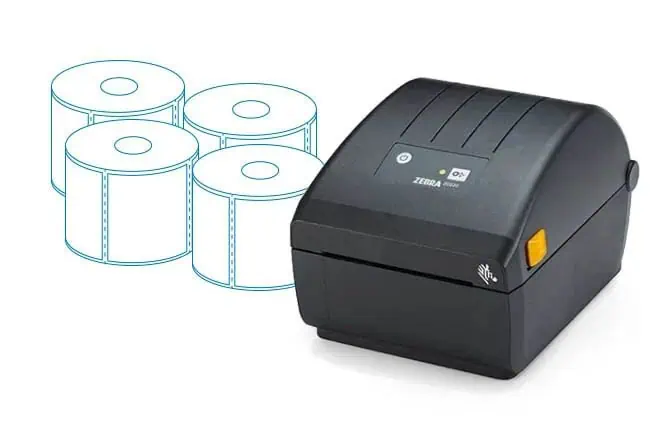As businesses strive to reduce their environmental footprint, sustainable practices in shipping and logistics have become increasingly important. One area where companies can make a significant impact is through the use of eco-friendly labeling solutions.
In this blog, we will explore sustainable options and practices when using StarTrack labels and blank labels for shipping and logistics.
The Importance of Sustainable Labeling
Labels play a crucial role in the shipping process, providing essential information for the delivery and tracking of packages. However, traditional labels often contribute to environmental waste, particularly when they are not recyclable or biodegradable.
By adopting sustainable labeling practices, businesses can reduce their environmental impact, improve their brand image, and meet the growing demand for eco-friendly products from consumers.
Eco-Friendly Options for StarTrack Labels
StarTrack labels are widely used in the logistics industry for their efficiency and reliability. To make these labels more sustainable, businesses can consider the following options:
1. Recycled Materials
Using recycled materials for StarTrack labels can significantly reduce the environmental impact. Many suppliers now offer labels made from post-consumer recycled content, which helps to conserve resources and reduce waste. By choosing labels made from recycled paper or plastic, businesses can support the recycling industry and contribute to a circular economy.
2. Biodegradable Labels
Another sustainable option for StarTrack labels is biodegradable materials. These labels are designed to break down naturally over time, reducing the amount of waste that ends up in landfills.
Biodegradable labels are typically made from plant-based materials such as corn starch or sugarcane, which are renewable and have a lower environmental impact compared to traditional petroleum-based plastics.
3. Water-Based Adhesives
The adhesive used on labels can also affect their environmental impact. Traditional adhesives often contain harmful chemicals that can leach into the environment. Water-based adhesives are a more eco-friendly alternative, as they are free from solvents and other toxic substances.
These adhesives are also easier to remove during the recycling process, making the entire label more sustainable.
Sustainable Practices with Blank Labels
Blank labels offer flexibility and customization for various shipping needs. By adopting sustainable practices when using blank labels, businesses can further minimize their environmental footprint:
1. Print-On-Demand
One of the most effective ways to reduce waste with blank labels is to implement a print-on-demand system. This approach ensures that labels are only printed when they are needed, eliminating excess inventory and reducing the likelihood of labels becoming obsolete.
Print-on-demand can be particularly useful for businesses that frequently update their branding or shipping information.
2. Eco-Friendly Printing
The printing process itself can also be optimized for sustainability. Using eco-friendly inks, such as vegetable-based or soy-based inks, can reduce the environmental impact of printed blank labels.
These inks are less toxic and easier to remove during recycling, making the labels more environmentally friendly. Additionally, businesses can invest in energy-efficient printers to further reduce their carbon footprint.
3. Recyclable and Compostable Labels
Similar to StarTrack labels, blank labels can also be made from recyclable or compostable materials. Recyclable labels can be processed and reused to create new products, while compostable labels break down naturally in composting environments.
By choosing these sustainable options, businesses can ensure that their labeling practices align with their environmental goals.
Best Practices for Sustainable Labeling
In addition to selecting eco-friendly materials and printing methods, businesses can adopt several best practices to enhance the sustainability of their labeling processes:
1. Source from Certified Suppliers
When purchasing StarTrack labels and blank labels, it is important to choose suppliers that adhere to recognized environmental standards. Certifications such as FSC (Forest Stewardship Council) or SFI (Sustainable Forestry Initiative) indicate that the materials used in the labels are sourced responsibly.
By sourcing from certified suppliers, businesses can ensure that their labels meet high environmental and ethical standards.
2. Reduce Label Size
Minimizing the size of labels can help to reduce material usage and waste. Businesses should evaluate their labeling requirements and consider whether smaller labels can effectively convey the necessary information. In many cases, concise and well-designed labels can be just as effective as larger ones, while using fewer resources.
3. Promote Recycling
Educating customers and employees about the importance of recycling labels can enhance sustainability efforts. Businesses can include recycling instructions on their blank labels and provide information on how to properly dispose of them.
Encouraging customers to recycle shipping materials, including labels, can help to create a more sustainable supply chain.
4. Regularly Review and Improve Practices
Sustainability is an ongoing process, and businesses should regularly review their labeling practices to identify areas for improvement. By staying informed about the latest advancements in eco-friendly labeling technologies and materials, businesses can continuously enhance their sustainability efforts.
Regular audits and assessments can help to track progress and ensure that sustainable practices are being effectively implemented.
Final Words
Sustainable labeling practices are essential for businesses looking to reduce their environmental impact in the shipping and logistics industry. By choosing eco-friendly options for StarTrack labels and blank labels, such as recycled materials, biodegradable labels, and water-based adhesives, businesses can contribute to a more sustainable future.
Additionally, adopting best practices such as print-on-demand, eco-friendly printing, and promoting recycling can further enhance sustainability efforts. By making these changes, businesses can not only reduce their environmental footprint but also meet the growing demand for sustainable products from consumers.
Choose Dial A Label today as it is a leading supplier of StarTrack labels at a wholesale rate.

